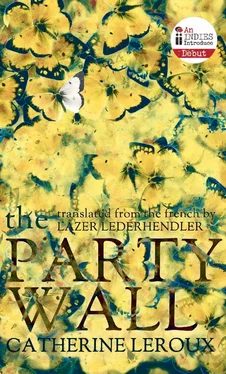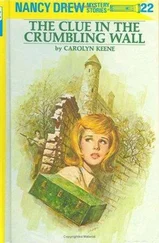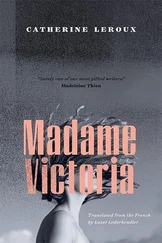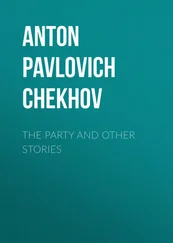“I want…”
Every atom in the room draws closer to her, as though the energy of the world were concentrating around her mouth to help her continue. The universe is all ears.
“I want…”
The waiting turns into a hum, the darkness grows luminous; something is still missing — one more try.
“I want some peanut butter.”
There, it’s said. Now the inner commotion can quiet down. One more gust of wind and it’s over. Through the long exhalation that carries her off, Francisca can hardly hear a voice murmuring, “Mother, you’re allergic to peanuts.” She is far away now.
Brother and sister stare at each other, incredulous, dishevelled, demoralized. The electrocardiogram sends out a long beep, which Carmen kills by pressing a chrome-plated button. Simon stands up, walks around the room four times, seizes the cat and hurls it against the wall with all his might.
“Peanut butter?!”
Carmen picks up the animal’s head, which has rolled to the foot of the bed.
“She was delirious, Simon.”
He sinks into his chair and buries his forehead in his fingers. Carmen comes over and places her hand on his shoulder. Frannie’s body seems to be slowly vanishing, dissolving amid the urine-soaked sheets. The smell does not bother them; it dissipates in the room, where the walls have retained the effluvia of a thousand deaths, the miasma of bile, fear, sweat, damned breath, and swollen lips, which, at the very end speak nonsense, because the end of a life is never a redemption, because we die as we have lived. Absurdly and untruthfully.
Someone knocks softly on the door three times before opening. Simon gets up, Carmen steps toward the doorway, both of them dazzled by the chemical light flooding in from the corridor. A young woman stands unsteadily in front of them. She looks in the direction of the bed, and her eyes well up with water.
“I’ve come too late,” she mutters.
She reaches into her bag and proffers two scraps of paper to the orphans along with a muddled clump of fur. Bastard the cat’s tail.
GOLD MINES IN RUSSIA (MONETTE AND ANGIE)
To anyonewho shops in supermarkets, the shelves in Mr. Dodge’s little grocery store seem to have undergone rationing befitting the era of world wars. But for Monette, what they hold is nothing short of princely. She shuttles between two aisles: confectionery, sprinkled with lollypops, liquorice, chewing gum, and jujubes that gleam with the magnetism of precious stones; and pastry, less appealing to the eye but with possibilities far beyond those of mere candies — chocolate, vanilla, the lightness of sponge cake, and the fabulous density of brownies.
Looking up from an inventory sheet, Mr. Dodge makes a show of coming to the little girl’s assistance.
“Can I make some suggestions, miss? I notice that you have your eye on the soap chewing gum. A wise choice, if I may say so. It will last much longer than a jujube, which gets swallowed in no time. What’s more, it wards off dirty words.”
Monette gives the grocer a look of suspicion, but he is not in the least put off and points to another counter.
“Then again, we’re offering excellent value for your money this week with our sugar-coated donuts. But be careful: the icing sugar leaves traces on your clothing that your mother can easily notice!”
Completely ignoring these recommendations, Monette continues to make her way down the pastry aisle, satisfied that she has shaken off the pattering salesman. While she grasps mouth-watering packages one by one to get a closer look, Angie leafs through magazines. On the first page of one periodical is a picture of a huge herd of dead cows. Another shows a woman in a race moving away from a tightly packed group of runners. In the middle of the last magazine, Angie gets lost in some dizzying photos of a Russian gold mine. Once she has gone through the series of photos, she realizes she must come to the aid of her younger sister, who is having as much trouble choosing a treat as she has tying her shoelaces. When she comes alongside the little body hopping left and right, Angie gently takes hold of the coveted packages and reads aloud:
“Sugar, enriched flour, hydrogenated canola oil…”
Monette listens attentively to the litany her sister recites for three different products and finally settles on a molasses cookie, seduced no doubt by the terms niacin and brown no. 28 . Mr. Dodge gives her a connoisseur’s nod of approval, and the little girl, now free of the burden of decision, responds with a good-humoured greeting. Angie takes a few more moments to bask in the coolness of the shop before she opens the door and confronts the swelter of the morning and the stifling fabric knitted by the boys, who — maybe in expectation of the two girls exiting the shop — have tightened their ranks so that it is virtually impossible to go down the stairway.
Clutching her cookie, Monette looks up in despair at her sister. Angie instantly gives in to the mute appeal and lifts up the child, who twists her chubby limbs around her sister. Angie’s voice is unwavering:
“Make way,” she commands.
As if by magic, the boys part and open a path where Angie can gingerly set down one foot after the other, somehow managing to keep her balance under the weight of her precious cargo. She knows that Monette, facing backward, has closed her eyes; Angie can also smell the molasses cookie tucked securely between her shoulder and her sister’s chest, safely out of sight. When she reaches the sidewalk, a voice rings out behind her, an arrogant organ just recently broken.
“Too bad; next time, wear a skirt. Not much to look at on the outside but maybe there’s something worth seeing under your shorts.”
Without flinching, Angie puts down Monette, who sprints across the street as if to lay down a definite boundary between them and the teenagers. With her head held high, Angie goes to join her. Behind her she senses the pack slowly moving off. One at a time, the boys get off their numb backsides, stand up on their lazy legs, and amble down the street, making sure to be noticed. Pretending to arrange one of her sister’s braids, Angie waits. It’s imperative for her to know which direction they will take. Praying that they continue southward, she prolongs the adjustments while Monette, already indifferent to the goings on across the road, fusses with the wrapping of her treat.
They seem to dither endlessly before heading off. They go north, toward the pony and their house, where Mam is scrubbing away at the floor with that old, animal-like brush that has always been there. Without further ado, Angie leads her sister to one of the many trails that cut through the woods.
“Where are we going?” Monette inquires.
“We’ll walk along the train tracks to get home.”
The little girl frowns. She’s not fond of detours.
“Maybe we’ll see a train!” the older sister coaxes.
Monette calms down. It’s true, there’s always the train.
TO BE BUT ONE (MADELEINE AND MADELEINE)
Although shehas yanked out dozens of grey hairs — a losing battle, now given up — this one hurts a little more than the others. She begins three times, curling her index finger around a hair at the top of her skull, without daring to pull. In the end, a creaking sound upstairs prompts her to deliver the coup de grâce . She hastily slips the faded thread into a plastic bag identical to the one containing a lock stolen from Édouard’s comb and hides the documents under a crumpled tablecloth. A few seconds later Joanna appears, already dressed in her cycling shorts, prepared to tackle the eighty-odd kilometres she covers each day “to stay in shape.” She flashes her widest grin and goes out noiselessly, leaving Madeleine to marvel at how someone that big can be so unobtrusive.
Читать дальше











